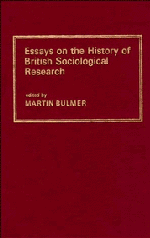Book contents
- Frontmatter
- Contents
- Preface
- Contributors
- Introduction
- History
- 2 Social monitors: population censuses as social surveys
- 3 The emergence of the sociological survey, 1887–1939
- 4 Durkheim, Booth and Yule: the non-diffusion of an intellectual innovation
- 5 The Government Social Survey
- 6 Methodological research on sample surveys: A review of developments in Britain
- 7 Mass-Observation 1937–1949
- 8 The Institute of Community Studies
- 9 Provincials and professionals: the British post-war sociologists
- 10 On the eve: a prospect in retrospect
- Use
- Index
9 - Provincials and professionals: the British post-war sociologists
Published online by Cambridge University Press: 12 November 2009
- Frontmatter
- Contents
- Preface
- Contributors
- Introduction
- History
- 2 Social monitors: population censuses as social surveys
- 3 The emergence of the sociological survey, 1887–1939
- 4 Durkheim, Booth and Yule: the non-diffusion of an intellectual innovation
- 5 The Government Social Survey
- 6 Methodological research on sample surveys: A review of developments in Britain
- 7 Mass-Observation 1937–1949
- 8 The Institute of Community Studies
- 9 Provincials and professionals: the British post-war sociologists
- 10 On the eve: a prospect in retrospect
- Use
- Index
Summary
A continental visitor to the social sciences in Britain after the Second World War would have noticed the secure establishment of economics in Cambridge and politics in Oxford. These subjects also enjoyed a sturdy, if modest, existence in such other universities as Manchester and Glasgow. But at the distinctive London School of Economics and Political Science the visitor's eye might have been caught by about a dozen students of sociology, similar in age but of a style and outlook markedly contrasted with those of their Oxford contemporaries. They took their degrees, and busied themselves around Houghton Street with a novel aspiration. They wanted to become professional sociologists. I was one of them. Fifteen years later Raymond Aron was visiting Oxford and some of us were gossiping about the state of the British sociological art. Aron suddenly cut in to exclaim: ‘The trouble is that British sociology is essentially an attempt to make intellectual sense of the political problems of the Labour Party.’ Fifteen more years later Ernest Gellner suggested that I write an essay on what turned out to be the first group of career sociologists in Britain. What had been their political and intellectual concerns? What formed their unprecedented and unlikely occupational ambition? And what happend to them and their intentions?
To be more precise by enumeration, the group consisted of thirteen people, twelve of whom graduated from the School between 1950 and 1952, one of whom came from elsewhere to join them as a graduate student.
- Type
- Chapter
- Information
- Essays on the History of British Sociological Research , pp. 151 - 164Publisher: Cambridge University PressPrint publication year: 1985
- 7
- Cited by



